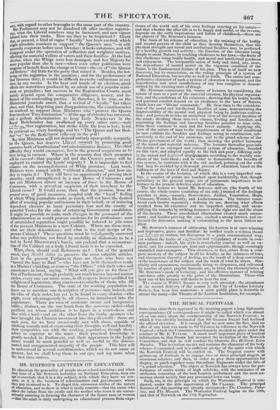MR. SIMPSON'S LECTURES ON EDUCATION.
BY education the generality of people mean school-teaching; and when they hear of a Mr. SIMPSON lecturing on National Education, they are apt to conclude that it is a dry subject, with which they have no con- cern, as it is the business of schoolmasters and governesses, whom they pay to attend to it. To dispel this erroneous notinn of the nature of education, and to show in what it really consists—that the nurse who takes the infant from the cradle and the mother who rears it are uncon- sciously assisting in forming the character of the future man or woman —that the adult is daily undergoing an educational process from expe- rience of the world and of his own feelings reacting on his nature— and that whether the after life is to be happy and useful, or the reverse, depends on the early impressions and habits of childhood,—these are the objects of Mr. SIMPSON'S lectures.
The basis of his scheme of education, is the training of the bodily and mental powers of the child as they develop themselves, that the physical strength and moral and intellectual faculties may be perfected by a healthy growth and activity ; the function of the educator being simply to assist Nature, by teaching obedience to her laws,—the fruits of this obedience being bodily health, and moral and intellectual goodness and enjoyment. The inseparable union of body and mind, nay, more the dependence of mental power on the vigorous condition of the frame, is the fundamental feature of his plan. This is of itself no new discovery, but its enunciation, as the ruling principle of a system of National Education, has novelty as well as truth. The entire and com- prehensive character of such a system of education is apparent, and the imperfection and utter insufficiency of any less complete is demon- strated by the existing state of things.
Mr. Simrsox commences his course of lectures by considering the nature of man as a part of the material creation, his physical organiza- tion, and the conditions of his existence ; showing that his bodily health and personal comfort depend on an obedience to the laws of Nature, which laws are "Divine commands." He then rises to the considera- tion of the moral and intellectual faculties of man, demonstrating the improveability of the mental and physical being by judicious cultiva- tion ; and proceeds to take an analytical view of the several faculties of the mind ; dividing them into two classes, Feeling and Intellect, and separating the feelings and knowing faculties peculiar to man only, from those common to man and the lower animals. Applying thi, view of the nature of man to the requirements of his social conditions he now exhibits the faculties and feelings acting in combination, sub- serviently to the end of his existence, and to the grand scheme of the Divine government of the world ; thus showing the perfect harmony of the moral and material universe. The lecturer thereafter goes into the details of an enlarged and rational system of education, founded on this view, and adapted equally to the rich and poor ; differing only in the extent and clegne ()f acquirements, according to the worldly con- dition of the individual ; and in order to demonstrate the benefits of this system, he contrasts with it the old method, pointing out the evils that may be avoided by a thorough process of education, based on the fulfilment of the laws of God and Nature.
In the course of the lectures, of which this is a very imperfect out- line, a number of points are touched upon incidentally, that, though subsidiary to the general scope, are of paramount importance in re- ference to the present defective state of education.
The last lecture we heard Mr. SIMPSON deliver, (the fourth of his course, the whole course consisting of six only,) treated of the feelings peculiar to man,—namely, Benevolence, Justice, Veneration, Hope, Firmness, Wonder, Ideality, and Ludicrousness. The lecturer consi- dered each faculty separately ; defining its use, showing what effects resulted from its excessive and its imperfect activity, and exem- plifying his remarks by striking instances of the right use and the abuse of the faculty. These anecdotical illustrations created much amuse- ment ; and besides proving the case, excited a strong interest, and en- livened. the discourse, making it entertaining to the most listless au- ditor.
Mr. SIMPSON'S manner of addressing his hearers is at onee winning and impressive, grave and familiar : he neither reads a written theme an oration, but discourses in a plain conversational way, t.rebion and redundancy of words in coma-
yet without the laxity of
mon parlance : indeed, his style is remarkably concise as well as ex- plicit, and his sentences are neat and. epigrammatic, though seemingly unstudied and extempore. This clearness, in fact, arises from a com- plete mastery of the subject in all its details ; as the calmness of tone, and transparent sincerity of feeling, are the result of a deep conviction of the importance of the subject and the truth of what he utters.. Sim- plicity and earnestness, occasionally rising to eloquence, and enlivened by touches of quiet, playful humour, are, in brief, the characteristics of Mr. SIMPSON'S mode of lecturing ; and his effective manner of relating anecdotes adds greatly to the point of the illustrations. Those who hear one of his lectures will desire to hear the rest.
The course at Willis's Rooms is very well attended : the attendance at the second delivery of the course at the City of Lon don Literary Society, has been less numerous : a more public place is desirable to attraci the ninny—time Theatre of the London Institution, for example.


























 Previous page
Previous page